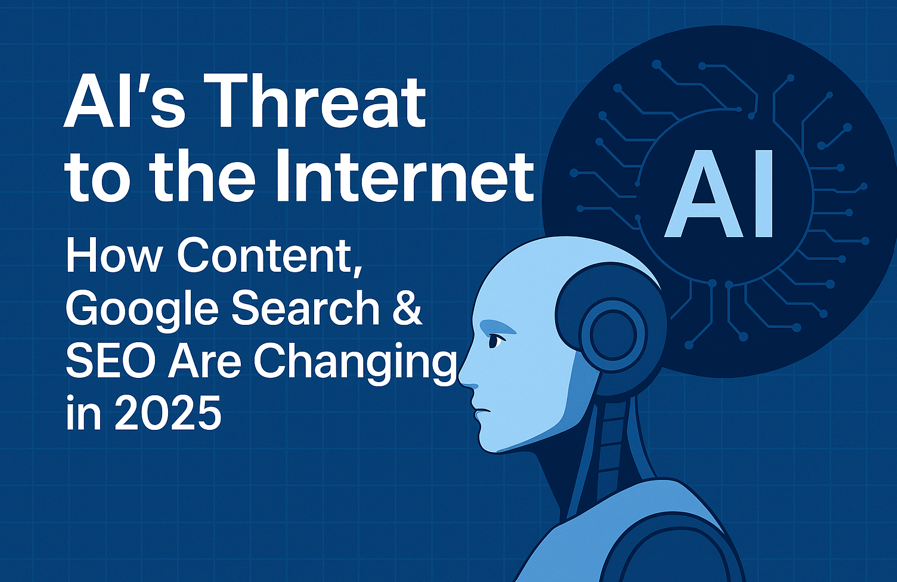Artificial Intelligence has transformed from cutting-edge technology to a mainstream digital tool — quietly reshaping how the internet functions today. From content automation to AI-driven SEO tools, AI promises speed, scale, and efficiency. But beneath the surface lies a persistent danger: the erosion of online authenticity, authority, and human creativity.
And that brings us to an unsettling question:
As AI-generated content floods the web, what happens when humans stop being the primary creators or consumers online?
In this blog, we’ll explore the risks from a human perspective — including Google’s response, the impact on SEO, and the unsettling “Dead Internet Theory.”
The New Internet: A Mix of Humans, Bots, and Machine-Generated Content
AI-driven content creation tools like ChatGPT, Jasper, and others have made it possible for anyone to create content at scale, often without expertise or research. While this democratizes access, a growing concern is emerging:
The internet is becoming oversaturated with content that lacks depth, experience, and originality.
Search engines struggle to differentiate real expertise from machine-mimicked output.
Users find it harder to trust what they read, click, or engage with.
According to a study by GhostData in 2024, over 30% of active web pages now contain content created or managed by AI tools — and the number is growing steadily.
 The Real Threat: Content May Live On, Humans May Not
The Real Threat: Content May Live On, Humans May Not
Let’s examine a critical possibility:
What happens to the internet when AI not only produces content but starts consuming and responding to it as well?
This is where the Dead Internet Theory comes into play.
Understanding the Dead Internet Theory
The theory suggests:
A vast portion of online content is now created by bots or AI scripts.
Comments, traffic, even forum activity could be artificially generated.
The web might become a closed loop—where bots talk to bots, and humans become the minority.
While this theory has speculative elements, some of its symptoms are already visible: generic blog posts, repetitive search results, auto-generated reviews, and inactive social engagement.
Google’s Fight to Preserve a Human-First Web
Google is aware of the shifting landscape and has already taken steps to counter it. In late 2023, Google updated its Search Essentials and reaffirmed the value of E-E-A-T:
“Content created to help people, showing real-world experience and expertise, will be rewarded—even if AI was used in the process.”
Google’s new direction means:
AI content without human oversight is less likely to rank.
Experience-based content is now a stronger ranking signal than ever.
Brands must show credibility through expert author pages, sourcing, and digital footprint.
AI and SEO: Automation vs. Authenticity
AI-powered SEO tools have forever changed how keyword research, content planning, and even backlinks are built. But this convenience comes at a cost:
Auto-generated articles flood search results.
AI can rewrite existing content without adding new value.
AI can now create fake backlinks or forum posts at scale.
This dynamic creates a cycle: AI scripts create content, and search bots crawl and index it—resulting in a web that exists without meaningful human involvement.
This is the risk:
The internet may remain alive in terms of traffic and algorithms, but dead in terms of truth, depth, and humanity.
How to Stay Safe: A Human-First Digital Strategy
Here’s how brands, marketers, and SEOs can protect their presence:
1. Show Real Experience
Incorporate case studies, first-hand reviews, or real examples that AI cannot fabricate.
2. Publish as People, Not Machines
Use real author bylines, bios, images, and credentials.
3. Prioritize Quality Over Quantity
A single well-researched article is worth more than 10 AI-written summaries.
4. Let AI Assist, Not Lead
Use AI as a brainstorming or structuring tool, but ensure every piece is human-reviewed, fact-checked, and aligned with your audience’s real needs.
5. Build Trust Signals
Encourage genuine reviews, appear on trusted platforms, engage in professional communities, and use schema for authorship and reviews.
Final Word: The Internet Doesn’t Need More Content — It Needs More Humanity
AI’s evolution is inevitable. But whether it destroys or enhances the web depends on how we use it. As creators, marketers, and educators, we have a responsibility to create content that is not just optimized, but honest, helpful, and human.
In an age where content can be mass-produced with a click, the most valuable thing you can be is real.
If you’d like help creating content that’s credible, well-researched, and stands strong in the AI era, I can support with:
E-E-A-T optimized writing
Content strategy built on experience
Human-AI blended content workflows
SEO updates aligned with Google’s latest standards





